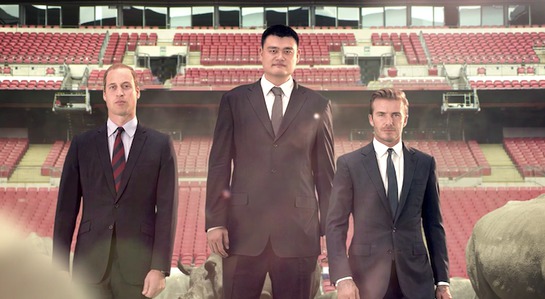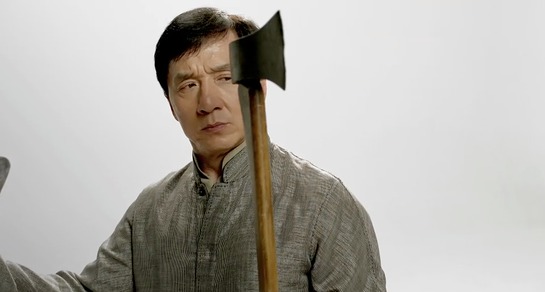As government leaders gather in London to discuss new measures to counter wildlife trafficking, WildAid and conservation’s top stars released two new messages as part of the world’s largest campaign to reduce the demand for endangered species products.

Credit/Copyright: WildAid
One message, “Whole World”, features The Duke of Cambridge, David Beckham, NBA great Yao Ming, and a crash of rhinos courtesy of GreenScreen Animals. The other, “Tools of the Trade”, co-produced with the African Wildlife Foundation (AWF), features action star Jackie Chan, Spike a white rhino, and a computer-generated rhino made of weapons.

Credit/Copyright: Kristian Schmidt - WildAid
Last year, Chinese media including CCTV, Xinhua, and Sina.com, donated over US$100 million of media space to the campaign and, together with a government ban, is attributed with reducing China’s shark fin consumption by 50-70%.
“Sadly all the wild rhinos in the world can [fit into Wembley Stadium] with room to spare,” said The Duke in WildAid’s latest message. “Together we can save our wild rhinos. When the buying stops, the killing can too.”
“Whole World” asks viewers to imagine the world’s entire rhino population fitting inside Wembley and how we could increase their numbers by stopping trade in rhino horn.
“Ask your friends and family never to buy rhino horn,” said David Beckham.
WildAid ambassador and former NBA star Yao Ming has seen the poaching first hand on two visits to Africa while filming an upcoming documentary with WildAid. “We can fill [Wembley] and many more [stadiums] if we can stop the illegal trade,” Yao says in the new message.

Credit/Copyright: WildAid
Longtime WildAid ambassador Jackie Chan came to London to urge government officials to redouble their efforts to stop illegal wildlife trafficking. “If you are buying rhino horn you may be paying for more than just the horn,” said Chan in a new message. “You’re paying for guns, bullets, poisoned arrows, chainsaws, axes, and machetes to hack off the face of the rhino. And you are paying for the life of a beautiful creature.”
In “Tools of the Trade” Chan dodges weapons as a ‘rhino’ is built of the tools of the poaching trade. After the ‘rhino’ is assembled, it collapses under its own weight, and the 6,300-pound Spike rises from the pile of weaponry. The message closes as Chan appeals to viewers not to buy rhino horn products. It will be screened extensively in conjunction with a billboard campaign in China and Vietnam.
South Africa’s Department of Environmental Affairs recently announced that poachers killed 1,004 of the country’s rhinos in 2013, compared to 13 in 2007.
“Just as with the drug trade, traditional focus on enforcement in producing countries has not worked – we must address the demand side if we are to save these animals,” said WildAid’s Executive Director, Peter Knights, who is speaking at this week’s International Wildlife Trafficking Symposium at London Zoo.
“From our vantage point on the ground in Africa, law enforcement alone cannot protect Africa’s wildlife from the demand of millions of consumers,” explained African Wildlife Foundation CEO Dr. Patrick Bergin, who is also attending the wildlife symposium in London. “As a global problem that demands a global solution, we need the voices of Jackie, Yao, and others to help draw attention to this crisis in consumer countries like China and Vietnam before it’s too late.”
A recent survey from WildAid, AWF, Horizonkey, and the Yao Ming Foundation indicates a large portion of China’s population is unaware that rhino horn products come from poached rhinos, yet a greater number of residents support government enforced bans.
To learn more about this campaign and ongoing efforts to stop the demand for rhino horn please visit www.wildaid.org/rhino or www.awf.org/sayno.
WildAid wishes to thank the production teams that created and produced these new messages including Homestead Productions for “Tools of the Trade” and Rebel at Outsider for “Whole World”.





